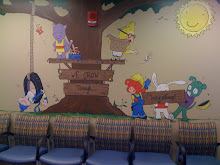Does anyone remember the dancing baby from the show Ally McBeal? While most toddlers can not dance that well, almost all of them can appreciate music. From infancy and onward your child can enjoy and respond to music.
Classical music is a good choice for newborns and older infants. When your baby is pleased with a particular song, she might be soothed, smile or laugh. Your baby might show displeasure with a particular song by crying. Singing or humming to a baby can be comforting for both parent and child. Toddlers and young children can enjoy a variety of musical styles so don't be afraid to expose your child to different kinds of music. They also love to dance so show off your dance moves. Your toddler will try to imitate you and your school age child will show off her own moves.The other day I was driving with my 21 month old son, when the song SHOUT by Otis Day came on the radio. Many people might remember this song from the movie Animal House. Immediately a twinkle appeared in my son's eyes as he smiled and started to move to the music. He threw both of his chubby little arms in the air, rocked to the beat and started kicking his feet. He even began to babble the words to the song. I laughed so hard tears came to my eyes.Teens listen to music a great deal and use it to help express certain moods. Take a moment and find out what kind of music your teen likes and which songs express which moods the best. You may benefit from the information in other ways. You'll know your teen had a bad day when you hear him playing his sad mood song or he has a new girlfriend when the love songs get played. Today so many songs that were popular decades ago are being redone by current artists, that you might even be surprised to find some common ground.
Lastly, don't discount the power of music to affect your mood. After a hectic day, a good song can elevate your mood, help you get through the evening and deal with the demands of your children on your time and person.
......Dr. Trina

